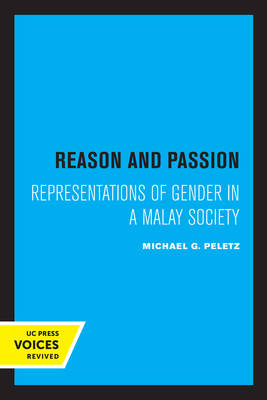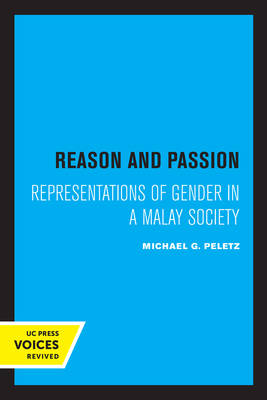
- Afhalen na 1 uur in een winkel met voorraad
- Gratis thuislevering in België vanaf € 30
- Ruim aanbod met 7 miljoen producten
- Afhalen na 1 uur in een winkel met voorraad
- Gratis thuislevering in België vanaf € 30
- Ruim aanbod met 7 miljoen producten
Zoeken
€ 84,95
+ 169 punten
Uitvoering
Omschrijving
This book provides a historical and ethnographic examination of gender relations in Malay society, in particular in the well-known state of Negeri Sembilan, famous for its unusual mixture of Islam and matrilineal descent. Peletz analyzes the diverse ways in which the evocative, heavily gendered symbols of "reason" and "passion" are deployed by Malay Muslims. Unlike many studies of gender, this book elucidates the cultural and political processes implicated in the constitution of both feminine and masculine identity. It also scrutinizes the relationship between gender and kinship and weighs the role of ideology in everyday life. Peletz insists on the importance of examining gender systems not as social isolates, but in relation to other patterns of hierarchy and social difference. His study is historical and comparative; it also explores the political economy of contested symbols and meanings. More than a treatise on gender and social change in a Malay society, this book presents a valuable and deeply interesting model for the analysis of gender and culture by addressing issues of hegemony and cultural domination at the heart of contemporary cultural studies. This title is part of UC Press's Voices Revived program, which commemorates University of California Press's mission to seek out and cultivate the brightest minds and give them voice, reach, and impact. Drawing on a backlist dating to 1893, Voices Revived makes high-quality, peer-reviewed scholarship accessible once again using print-on-demand technology. This title was originally published in 1996.
Specificaties
Betrokkenen
- Auteur(s):
- Uitgeverij:
Inhoud
- Aantal bladzijden:
- 416
- Taal:
- Engels
Eigenschappen
- Productcode (EAN):
- 9780520326866
- Verschijningsdatum:
- 15/07/2022
- Uitvoering:
- Paperback
- Formaat:
- Trade paperback (VS)
- Afmetingen:
- 156 mm x 234 mm
- Gewicht:
- 639 g

Alleen bij Standaard Boekhandel
+ 169 punten op je klantenkaart van Standaard Boekhandel
Beoordelingen
We publiceren alleen reviews die voldoen aan de voorwaarden voor reviews. Bekijk onze voorwaarden voor reviews.











